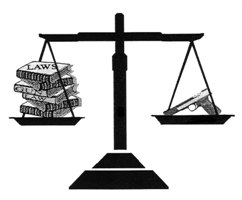Executive Editor
Court battles to determine the exact parameters of the Protection of Lawful Commerce in Arms Act (PLCAA) are far from over.
On Sept. 7, a five-judge panel of the New York Appellate Division, 4th Department, sitting in Rochester, heard arguments in a first-in-the nation case, deciding whether the Protection of Lawful Commerce in Arms Act (PLCAA), which was intended to shield the gun industry from frivolous lawsuits, protects gun sellers who “negligently and illegally” sell guns to traffickers.
The court panel is to decide whether to reinstate a lawsuit brought by Danny “Bud” Williams, who was a 16- year-old high school basketball phenom when he was shot and severely wounded in a case of mistaken identity nine years ago outside his Buffalo home, while playing basketball.
Attorneys for Williams argued the Ohio gun dealer, who sold Bostic and his girlfriend the 9mm handgun used to shoot Williams, as well as hundreds of other inexpensive handguns that eventually ended up on the streets of Buffalo and were linked to other crimes, had to have known something illegal was going on.
Given that, the attorneys said, the case has the components to move forward, fulfilling the exceptions to a federal law that generally says the gun industry is not responsible when its products are used by criminals.
“Gun manufacturers and distributors are not exempt from liability for negligently entrusting guns to downstream sellers,” the attorneys for Williams and the Brady Campaign argued in court papers. They said the gun manufacturer, distributor and dealer “supplied handguns to persons and entities who were likely to, and did, use the handguns in a manner involving unreasonable risk of physical injury to others.” The lower state court was wrong, the attorneys argued, when it ignored those facts, and dismissed the lawsuit Williams and his father, Eddie Williams, filed against Beemiller Inc., the Ohio-based gun manufacturer, MKS, the gun distributor, and Charles Brown, the licensed gun dealer.
Attorneys for the gun industry said the lower court judge, State Supreme Court Justice Frederick J. Marshall, got it right in April 2011 when he dismissed the lawsuit filed by the Williams family. Marshall ruled that the federal PLCAA immunized the gun companies from any liability.
In fact, the gun industry attorneys argued, this is just the kind of case the federal act was designed to have dismissed early on, preventing expensive and prolonged legal actions wrongfully blaming the law-abiding gun industry for the actions of criminals.
The criminals in this case, the gun industry attorneys said, are Bostic and Caldwell—the shooter and the gun trafficker. The gun manufacturer, distributor and dealer are not to blame, the attorneys said.
The Buffalo News reported that the gun industry attorneys said authorities investigating the Williams shooting, and the gun-trafficking operation Bostic ran, found no evidence to charge the gun industry with those crimes, adding that since the guns were sold in Ohio, New York State has no jurisdiction in the case.
In addition, the gun industry lawyers said, the Williams case does not meet any of the exceptions to the federal law that would allow the case to go forward.
While Williams’ attorneys claim that the gun industry showed criminal negligence by allowing Bostic to purchase the guns from the Ohio gun dealer, the dealer did nothing wrong, said attorney Scott Braun, representing Brown, the FFL.
Bostic had told Brown the guns were being purchased for a gun shop Bostic planned to open, Braun said. All the guns Bostic purchased were properly reported by Brown to the federal authorities, as is required for all multiple gun purchases, he said.




